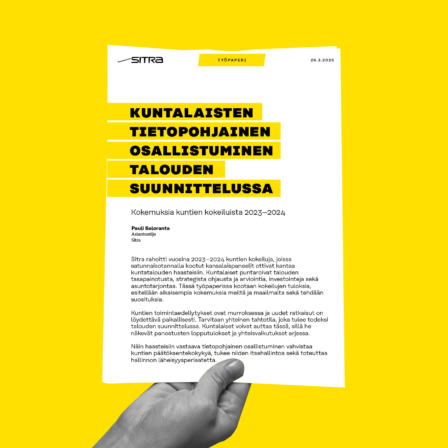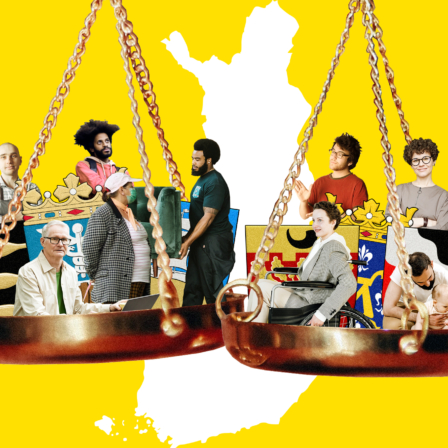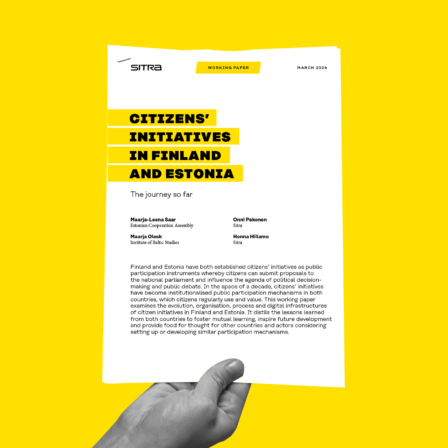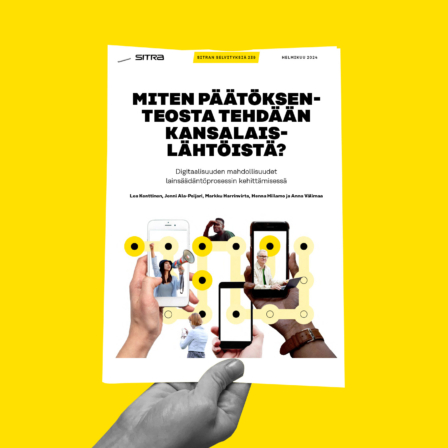In Finland, following the progress of citizens’ initiatives is complicated and requires knowledge of parliamentary work. Estonia has a single service that anyone can use to follow the process. In Finland, the citizens’ initiative must contain either a legislative proposal or a proposal for the drafting of legislation and the processing of initiatives takes up to 15 months. The Estonian citizens’ initiative is flexible and can be used for proposals other than ones. Parliament has an obligation to process the initiatives within six months.
The Finnish Parliament has no time limit for processing citizens’ initiatives. If an initiative has not been processed by the end of the parliamentary term, it lapses. It is common in Finland for government proposals to take precedence over citizens’ initiatives, especially towards the end of a parliamentary term. Sitra has already previously recommended a six-month deadline for the processing of citizens’ initiatives.
All of this is detailed in a Sitra study that compares the Finnish and Estonian citizens’ initiative systems and makes suggestions for improving the Finnish approach. The study supports Sitra’s work on renewing and strengthening democracy and improving the opportunities for public participation.
Finland has stricter requirements for citizens’ initiatives than Estonia
Citizens’ initiatives have become an established part of public life in both Finland and Estonia over the past decade. According to a survey conducted in connection with the 2023 parliamentary elections, up to 60 per cent of Finns said they had signed a citizens’ initiative. Citizens’ initiatives have become a highly popular way of participating in political decision-making, second only to elections. In the peak year of 2021, such initiatives collected almost 1.5 million signatures.
According to Sitra expert Onni Pekonen, the study shows that there is room for improvement in the Finnish system. Finland has stricter formal requirements for citizens’ initiatives than Estonia. The more careful the legal formatting of an initiative, the better its chances of progressing in Parliament.
“In Finland, the parliamentary processing of an initiative can lead to very effective changes, but the process is cumbersome. The Estonian system is more citizen-centered. This is something we could learn from in Finland,” says Pekonen.
Being able to track the progress of citizens’ initiatives would boost democracy
In Estonia, people can follow the parliamentary processing of initiatives on a single digital platform. The authors of an initiative, as well as the people who have signed it, can receive automatic updates on the progress of the process.
In Finland, people cannot follow the processing of citizens’ initiatives on the kansalaisaloite.fi service, but have to find the information separately on the Parliament’s website. This requires prior knowledge of the complex parliamentary process.
“Like Estonia, Finland could offer a platform that provides an overview of the entire citizens’ initiative process. This transparency would increase everyone’s confidence in participatory methods,” Pekonen adds.
In Estonia, a citizens’ initiative needs 1,000 signatures to be processed. In Finland, the figure is 50,000.
In Estonia, a citizens’ initiative needs 1,000 signatures to be processed. In Finland, the figure is 50,000. Estonians need to be at least 16 years old to submit or sign a citizens’ initiative, while in Finland the age limit is 18.
Read more about the Finnish and Estonian citizens’ initiative systems: Citizens’ initiatives in Finland and Estonia.
Sitra has recommended the creation of a digital service (in Finnish) for monitoring and influencing legislative projects.
The study is part of Sitra’s Democracy and participation theme. The theme aims to give representative democracy the means to reform, increase transparency in decision-making, and empower citizens.



















Recommended
Have some more.